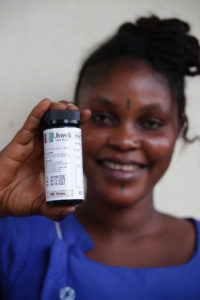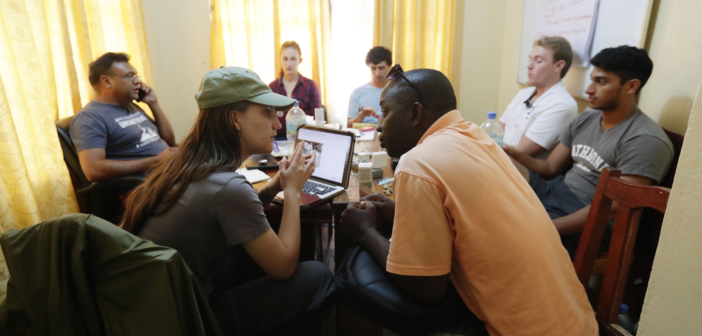A few days after Khanjan Mehta began working at Lehigh in 2016, he received exciting news. After years of research and hard work, he had won a $100,000 grant from Grand Challenges Canada.
Mehta would use this to help evolve Ukweli Test Strips, one of the many projects he brought with him from Penn State University.
“I can’t let this die,” said Mehta, the vice provost for Creative Inquiry and director of the Mountaintop Initiative.
Ukweli is an inexpensive test strip that screens pregnant women for urinary tract infections (UTI) and preeclampsia. Intended for use in developing countries, Ukweli’s current focus is distribution in Sierra Leone, which has the highest maternal mortality rate on the globe.
“Women are dying, and that’s not OK,” Mehta said. “We have to get to the root of it and see how we can contribute. We can’t solve the problem, but we can contribute a small, but significant, way to address the problem.”
Mehta began recruiting for a student team. Cassidy Drost, ’19, would join as one of the first members, after discovering the project through an email. As a pre-med sophomore at the time, interested in doing research, she jumped at the opportunity.
Sage Herrick, ’20, went to Mehta for internship advice sophomore year. Suggesting she get involved with Mountaintop campus, Mehta told her about Ukweli.
Naakesh Gomanie, ’20, joined after learning about it from Herrick, as the project aligned with his future aspirations to work in healthcare in developing nations. Gomanie later recruited business student Zachary Day, ’21, to help with marketing.
As the project grew, Day was accepted to the group by applying and interviewing with Mehta. These students, along with Jordan Wolman, ’21, and Rohan Ekambaram, ’21, comprise Ukweli’s current team.
Ukweli’s early developmental stages faced problems of capital cost, commercialization and practicality. Mehta said the team needed an affordable product that could be easily manufactured. Wangchen, a biomedical device manufacturer from China, would help solve this need.
The company could manufacture the test strip for approximately $0.01 each, and customize it to fit the team’s idea. The strip would screen for parameters of leukocytes, nitrites and pH to determine if the individual screened positive for a UTI.
Ukweli was evolving. In spring 2019, the team decided to add preeclampsia screening in the test strips. Mehta had learned of the issues from the disorder in West Africa during a trip to Liberia. After further research confirming preeclampsia as a major factor contributing to maternal mortality, the team decided to take action.
Drost said the team did this by switching the pH parameter to protein, as preeclampsia is detected by the presence of protein in urine. Although team members are still working on quality control, Drost said they have achieved 92 percent accuracy with the preeclampsia test.
Spring 2019 brought more advancements, as Ukweli became a project of the Global Social Impact Fellowship. As a project of the fellowship, the program now involves two semesters of a weekly credit-bearing class, credited team-based research, summer Mountaintop Experience, travel and field work.
The Global Social Impact Fellowship also gave the team the opportunity to get the word out about Ukweli. They applied and were accepted to present their published papers at the Global Humanitarian Technology Conference in Seattle, Washington.
The Ukweli product is not the project’s only pioneering aspect.
“What’s innovative about our project isn’t the test strips themselves, it’s really the system that we have created to integrate the strips into this health care system,” Drost said.
Last year, Drost was working on an application for the Ukweli test strips to be registered with the Pharmacy Board of Sierra Leone, which would allow the product to be sold there.
After cumulus data, documentation and approval from the Sierra Leonean Pharmacy Control Board, the Ukweli team received the news they had waited a year for. As of Oct. 16, 2019, Ukweli is registered in Sierra Leone. With this license, the team can now sell and market the test strips.
To help accomplish this, Ukweli worked closely with its partner World Hope International, a non-governmental organization that helps vulnerable communities access health services. Herrick said World Hope’s CEO and the country director of Sierra Leone are two of the many people involved on the ground, and help advise the team.
Ukweli also hired an employee in Sierra Leone to head community engagement. Hassan Sorie Koroma was the team’s translator for their first trip in 2018, and because he wanted to stay involved, he now works to get the word out about Ukweli to clinics in hopes of partnering and creating demand. He will soon become Ukweli’s distribution manager.
The Lehigh team traveled to Sierra Leone in August 2019. For its second trip, team members visited clinics and hospitals and offered Ukweli demonstrations. They worked with Koroma to train community health workers to screen women in the communities, using the test strips. Gomanie said several of the mothers tested positively, and were then referred to the clinics.

A resident of Sierra Leone poses with Ukweli, which is the inexpensive UTI test strip students brought in August. This test strip is intended for use in developing countries. (Courtesy of Stephanie Veto)
This process validated that their training system worked. Gomanie said he had a moment of realization in the clinic.
“This is real, and it can actually work,” he said. “The stuff we’ve been pouring our time, energy, heart and soul into is actually feasible, and is going to work.”
Herrick said the team was greeted with welcoming arms and accepted by health care staff and soon-to-be mothers.
“They trust us…they expect us to come back and see some of our faces again,” Herrick said. “It makes that accountability real.”
Day said it was amazing to see the work he puts in at Lehigh materialize across the world. He realized Ukweli can potentially save lives.
“I knew what we were doing was pretty impactful, but I didn’t realize the scale of it until I actually got there,” Day said. “Going out and seeing these actual clinics, seeing the people that would, in the long term, be impacted by our project, that’s where it really hit me.”
As Ukweli developed, the team expanded accordingly. Initially composed of primarily engineering and science students, the Ukweli team is now more interdisciplinary to support new areas of focus, including distribution and quality control and messaging and mass communication, which is vital to communicate with community health workers in Sierra Leone.
“That’s a beautiful evolution,” Mehta said. “It shows you what a typical life cycle of any such innovation looks like, and how it takes a village to get something to work.”
The next goal for Ukweli is to get the test strips adopted by the Ministry of Health. This would incorporate Ukweli into a list of approved medical devices and essential medicines. It would be paid for by the government and donors, and would be distributed to clinics and hospitals throughout the country.
To do this, the team must have strong data showing women are being referred, screened, diagnosed and treated. Their ultimate goal is to see mothers’ health improving and maternal mortality rates decreasing. Lehigh’s team and daily ground operations led by Koroma and World Hope are working together to collect this data over the next few years.
“We’re here to identify opportunities, work with various partners, co-create products and co-create solutions, but ultimately it has to become an independent, self-sustaining entity,” Mehta said.
Yet, Mehta said, this does not mean Lehigh will not be involved.
“We are committed to see this through to the very, very end, which is measurement and evaluation — and to see whether our test strips and all our blood, sweat and tears meet that final destiny of saving lives,” Mehta said.
Mehta has expansion in sight. He is currently working toward integrating Ukweli into the Liberian healthcare system — a country that also has high maternal mortality rates.
The Ukweli experience inspired Gomanie to go into a career in international development and health. Along with his passion for maternal and infant health, he said he now feels equipped to be effective in this field.
Herrick said she now has a higher standard for her own work, has become a better team player, and has learned how to negotiate with something that has consequences.
“It holds me to a higher standard, because I know that there is a huge system I’m letting down if I don’t do something correctly,” Herrick said. “There’s that push to be better, because that’s what’s needed.”
As a business school student, Day said it was “eye-opening” learning he was capable of integrating himself into a project so different from his coursework. This supports Mehta’s belief that undergraduate students can do much more than their academic coursework, and can help solve problems that matter. Drost’s takeaway from Ukweli is that it allowed her to apply her degree while she is still in school.
Mehta said students are often told that someday they’re going to use everything they’ve learned at school.
“We’re saying, ‘No, the day is now!’ Let’s go now, now, now, and learn,” Mehta said.
The team is looking for new members. Gomanie said students can come from any major, as long as they want to learn and work hard.
“We want students to have that kind of emotional engagement, have that kind of agency, have that kind of self-efficacy that they can go out and contribute to the world and be better citizens,” Mehta said.
Applications are due Nov. 10 at 11:59 p.m. Students can apply by choosing “Sierra Leone: UTI Test Strips to Improve Maternal Health.”






Comment policy
Comments posted to The Brown and White website are reviewed by a moderator before being approved. Incendiary speech or harassing language, including comments targeted at individuals, may be deemed unacceptable and not published. Spam and other soliciting will also be declined.
The Brown and White also reserves the right to not publish entirely anonymous comments.